Gut health for kids is about more than digestion—it impacts mood, sleep, and immunity. Learn how to nurture your toddler’s belly with simple, natural habits.
I feel, when parents talk about raising healthy, happy kids, the usual topics come up: bedtime routines, balanced meals, and limiting screen time. All of that matters, of course. But there’s one piece of the puzzle that often gets overlooked — and it affects everything from your child’s energy to their mood and even their immunity: gut health for kids.
I’m not a parent myself, but I’ve had plenty of chats with friends and family who are. And one thing I’ve noticed is how gut issues seem to sneak up on kids. A child who eats well but always feels tired. A toddler who struggles with constipation and crankiness. Or a little one with frequent tummy aches no one can explain.That’s when it really clicked for me: gut health isn’t just about avoiding stomach problems. It’s about giving kids a strong foundation for growth, immunity, and emotional well-being. That’s why I put this guide together — to share what matters most, the signs to look out for, and simple steps parents can take to keep digestion (and kids) happy every day.
Why Gut Health Is the “Hidden Hero” of Kids’ Health?
You’ve probably heard people say, “The gut is the second brain.” That’s not just a catchy phrase — it’s true. Inside the gut live trillions of bacteria, both good and bad. These tiny organisms form what’s called the microbiome, and for children, that microbiome is still developing.
Here’s why that matters:
Digestion and absorption: The gut breaks food into nutrients that fuel growth. Without balance, kids may eat well but not absorb what they need.
Immune defense: About 70% of the immune system is in the gut. This means a strong gut equals fewer sick days.
Mood and behavior: The gut communicates with the brain through the “gut-brain axis.” That’s why tummy troubles can lead to crankiness or even anxiety in children.
Allergies and skin health: Research shows poor gut health may be linked to eczema, food sensitivities, and allergies.
💡 Fact: Studies suggest that children with a healthier gut microbiome may even perform better in school because they’re less likely to suffer from fatigue or brain fog caused by digestion issues.
Signs of Poor Gut Health in Kids (And What to Watch For)
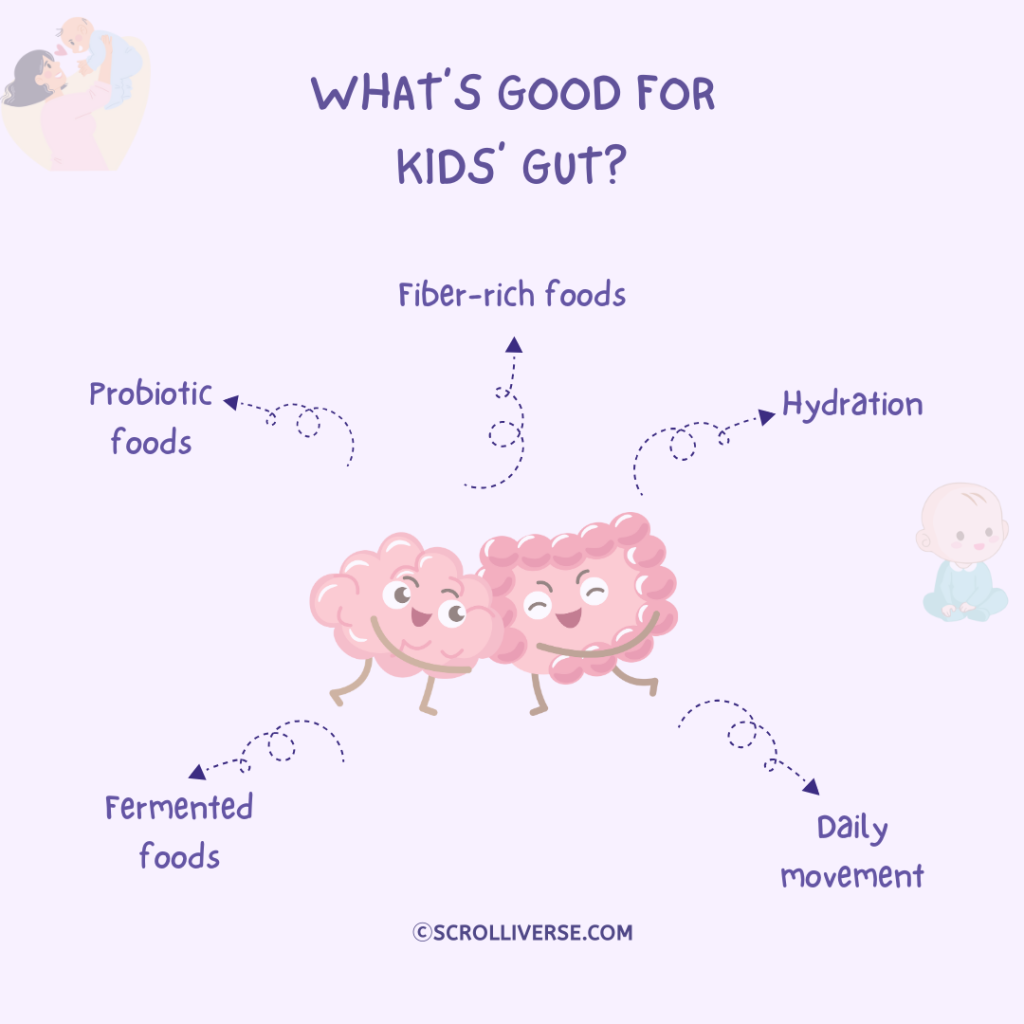
Children don’t always have the words to explain what’s going on in their bodies. That’s why parents need to keep an eye out for the subtle (and sometimes not-so-subtle) clues that point to gut imbalance. A healthy gut helps kids digest food, absorb nutrients, and feel energized — but when it’s out of balance, the body starts sending signals.
Below are some of the most common signs of poor gut health in kids that parents should look for:
Frequent Stomach Aches or Cramps
If your child often complains about tummy pain — especially after eating — it may be more than “just a phase.” Recurring stomach aches can be a sign that digestion isn’t working smoothly.
Pain after meals
Complaints of a “tight” or “hurting” stomach
Trouble finishing meals because of discomfort
Gas and Bloating
Kids naturally get gassy from time to time, but persistent bloating or excessive gas can point to gut imbalance.
Swollen belly after meals
Passing gas more than usual
Complaining of “feeling full” too quickly
Constipation or Diarrhea
Irregular bowel movements are one of the clearest indicators that something isn’t right with digestion.
Going several days without a bowel movement
Hard, painful stools
Loose stools or diarrhea that happen often
Sleep Issues
The gut and brain are closely linked through the “gut-brain axis.” When digestion is off, sleep can also be disrupted.
Trouble falling asleep or staying asleep
Restless nights without explanation
Waking up tired even after enough sleep
Behavioral Changes
Believe it or not, gut health can influence mood. Parents often report that kids with poor digestion seem cranky or irritable more often.
Sudden mood swings
Extra irritability or “meltdowns”
Difficulty focusing or paying attention
Skin Problems
Because the gut is linked to the immune system, imbalance can sometimes show up on the skin.
Rashes or redness
Flare-ups of eczema
Dry or irritated patches that don’t heal easily
Signs of Poor Gut Health in Toddlers
Spotting gut issues in toddlers can be even more challenging since they may not have the words to describe discomfort. Parents I know have noticed patterns like:
Refusing meals or pushing food away after a few bites
Crying after eating, which could point to tummy pain
Very irregular stools, from hard constipation to frequent diarrhea
Fussiness throughout the day, especially around mealtime
If you notice these patterns often, it may be worth discussing toddler gut health with your pediatrician. They can help figure out whether the issue is temporary or needs more support.
Gut Stories From Real Parents

Credit: parkwayeast.com.sg
Hearing from real parents always makes advice hit closer to home. Every child is different, but many moms and dads I’ve spoken with have shared how improving gut health completely changed daily life. Here are a few of their experiences:
🌟 “From Constant Complaints to Carefree Play”
Sometimes, kids complain so often that parents start thinking it’s “just normal.” But as one mom shared with me, that wasn’t the case at all.
My daughter was always clutching her tummy after meals. I thought it was a phase, but it turned out to be poor digestion. Once we added more fiber and probiotic foods, she stopped complaining. Now she eats without fear and has so much more energy to play.
🌟 “Better Sleep, Happier Days”
It’s amazing how much the gut can affect sleep — and in turn, everyone’s mood at home.
My 6-year-old used to wake up several times at night, tossing and turning. Our pediatrician suggested adding probiotics and more whole foods. Within weeks, he was sleeping soundly, and honestly, the whole household feels happier.
🌟 “Goodbye Crankiness, Hello Smiles”
Many parents don’t realize that mood swings can sometimes be linked to digestion. One dad told me this story:
We thought our son was just cranky by nature, but his moodiness was tied to gut issues. After adjusting his diet with more fruits, water, and fermented foods, we saw a night-and-day difference. He’s calmer, more focused, and way less irritable.
🌟 “Tiny Steps, Big Improvements”
Parents often assume big changes are needed, but even small swaps can transform gut health.
I started with one simple change — replacing juice with water and adding yogurt with probiotics. Honestly, that alone made a difference in my toddler’s constipation. It doesn’t have to be overwhelming.
👉 And just like some parents invest in gut-friendly routines, many also swear by everyday tools that support overall wellness—from using the best humidifier for baby’s room for better sleep to choosing the best baby toothbrush early on or even the best pacifier for breastfed baby for comfort. Small changes really do add up.
Products and Supplements for Gut Health
Some parents explore supplements to support the best gut health for kids. These might include:
Probiotic drops or powders (often labeled as gut health drops for kids)
Fiber gummies for picky eaters who avoid veggies
Multivitamins that include digestive support
⚠️ Always check with a pediatrician before starting supplements. Not every child needs them, but they can be a helpful tool when diets are limited.
When it comes to making life easier (and healthier!) for both you and your little one, these trusted favorites deliver real results. From probiotics that support digestion to gentle blends that help with regularity, these products are designed with kids’ sensitive tummies in mind. Let us look at some of the top products for kids’ gut health.
Kids Digestive Health – Prebiotic & Probiotic Sachets
Seed PDS-08 Pediatric Daily Synbiotic
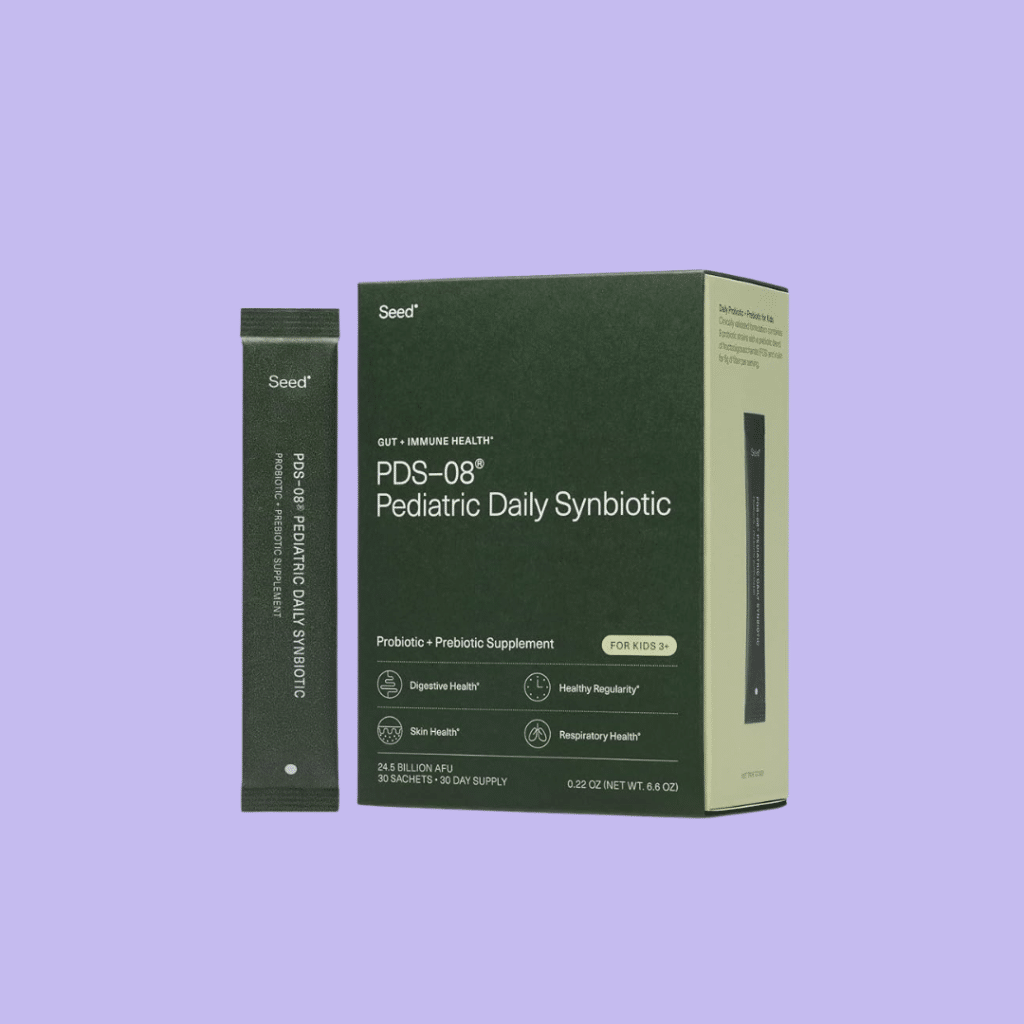
Credit: amazon.com
What's Good for Kids' Gut Health?
Seed PDS-08 Pediatric Daily Synbiotic is a clinically studied 2-in-1 blend of probiotics and prebiotic fiber, made just for children ages 3–17. With 9 probiotic strains and 5 grams of prebiotic fiber, it helps support gut balance, regularity, and immune health.
- 9 probiotic strains + 5g prebiotic fiber
- Supports digestion, immunity, and skin health
- Clinically validated for regularity in kids
- Unflavored sachets — mix into food or drinks
- Vegan, shelf-stable, and third-party tested
Kids Digestive Health – Probiotic Gummies
SmartyPants Kids Probiotic & Prebiotic Gummies
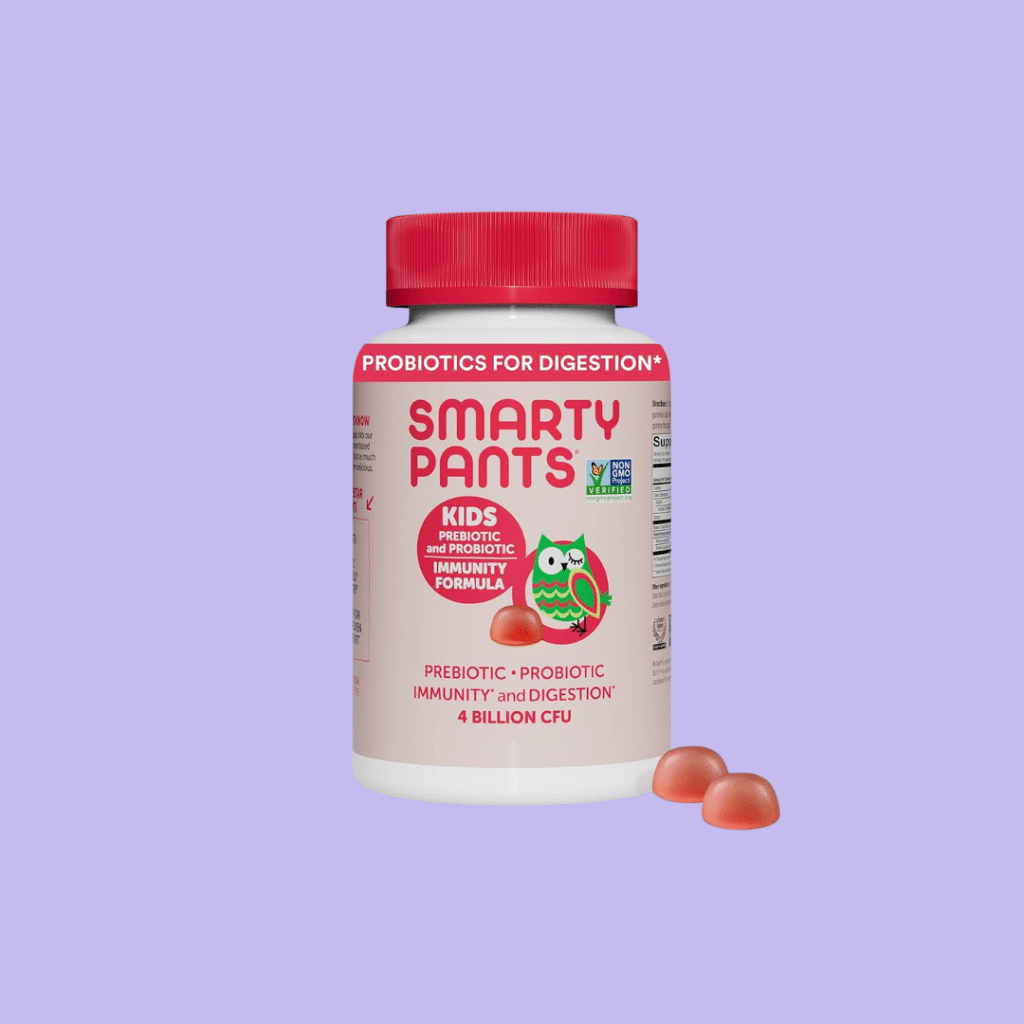
Credit: amazon.com
What's Good for Kids' Gut Health?
SmartyPants Kids Probiotic & Prebiotic Gummies combine science-backed probiotics with a kid-approved strawberry taste. Each gummy delivers a prebiotic (M-Gard) plus spore-forming probiotics that survive stomach acid, supporting healthy digestion and immune function.
- 2 clinically studied probiotic strains
- Prebiotic beta-glucan for immune support
- 95% survivability rate
- Clean Label Project Purity Award Winner
- Delicious strawberry flavor — vegetarian and allergen-free
Toddler Digestive Support – Powder Packets
LoveBug Tiny Tummies Probiotics
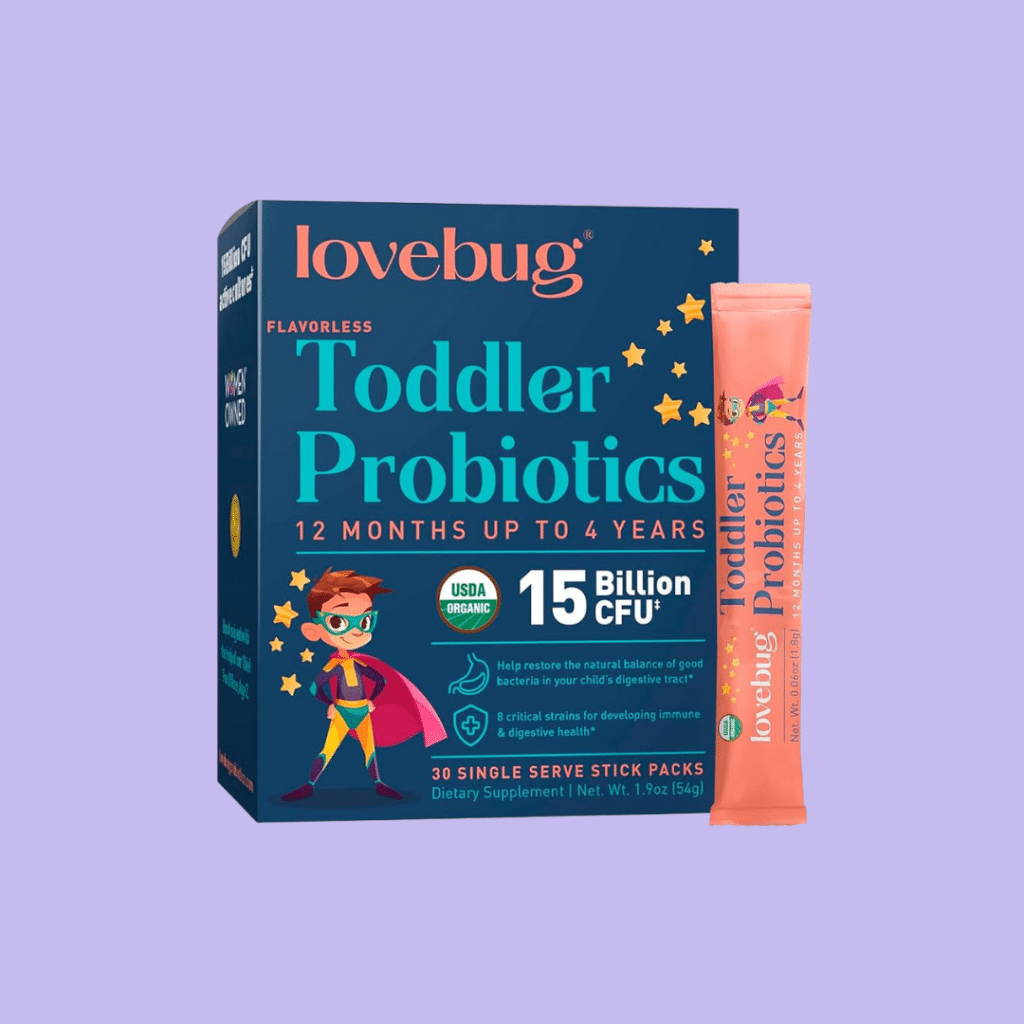
Credit: amazon.com
What's Good for Kids' Gut Health?
LoveBug Tiny Tummies Probiotics are specially designed for toddlers ages 12 months to 4 years. With 8 clinically tested strains, these easy-to-mix powder packets support softer bowel movements, ease constipation, and restore balance after antibiotics.
- 8 clinically studied probiotic strains
- Supports digestion, immunity, and regularity
- 15 billion active cultures per serving
- Flavorless powder packets
- Non-GMO, gluten-free, allergen-free, no artificial additives
Probiotics, Fermented Foods, and Kids
Many parents ask, are probiotics good for kids? The short answer is yes — when they’re introduced carefully and with guidance from a healthcare professional. Probiotics are “good bacteria” that live in the gut and help fight off harmful ones.
Here are some probiotic foods for kids that are easy to add to meals:
Yogurt with live cultures
Kefir (a drinkable form of yogurt)
Sauerkraut (mild versions work best for kids)
Pickles made through fermentation (not vinegar-based ones)
Other fermented foods for kids you can try:
Miso soup
Kimchi (just a tiny bit, since it can be spicy)
Kombucha (low sugar and in small amounts)
👉 On a related note, another parent I know swears by keeping soothing tools on hand — like finding the best pacifier for breastfed baby — because comfort and calm can go a long way in reducing stress on the gut. It’s all connected.
Best Foods to Support Healthy Gut Health for Kids
Supporting healthy gut health for kids doesn’t have to be complicated. It’s about building everyday habits. Here’s a food guide that parents I know swear by:
Fiber-rich foods: apples, pears, beans, and oats.
Colorful vegetables: broccoli, carrots, and spinach.
Whole grains: whole-wheat pasta, brown rice, oats.
Protein sources: lean meats, eggs, lentils, and nuts.
Hydration: plain water is always better than juices or sodas.
Pro tip: Turn mealtime into a fun adventure. Parents often tell me that kids are more likely to eat veggies when they help prepare them.
Toddler Gut Health: Why It’s Extra Sensitive
If you’re a parent of a toddler, you know how delicate their little bodies can be. Toddler gut health is particularly important because their microbiome is still shaping itself. During this stage, even one round of antibiotics or too many processed snacks can upset the balance of good bacteria.
Supporting toddler gut health often comes down to three simple practices:
Offer real, whole foods instead of packaged snacks.
Encourage water over juices or soda to keep digestion smooth.
Introduce probiotic foods in small portions (like yogurt or kefir).
Because toddlers are still developing their immune systems, keeping their gut balanced is like giving them a strong foundation for the rest of their health.
Lifestyle Habits That Support Kids Digest
Diet is key, but lifestyle also plays a big role in how well kids digest food. Simple daily habits can make a big difference:
Encourage kids to chew food slowly to help digestion.
Make sure they get plenty of movement and outdoor play.
Limit sugary snacks that feed “bad” gut bacteria.
Keep a consistent sleep schedule since rest helps the gut repair itself.
I’ve seen parents try small changes like family walks after dinner or replacing soda with flavored water, and the results were surprising — fewer complaints of tummy pain and more energy during the day.
Quick Parent Checklist
Here’s a quick-reference guide for supporting your child’s gut health:
Offer fiber daily (fruits, veggies, grains).
Add probiotics or fermented foods.
Cut back on processed and sugary foods.
Keep them hydrated.
Encourage daily play and regular sleep.
Nurturing End Note
The gut truly is the foundation of a child’s overall well-being. When you focus on gut health for kids, you’re not just helping them digest better — you’re strengthening their immune system, improving their mood, and setting them up for lifelong wellness.
And if you’re a parent reading this, you’re not alone. Many parents I know felt lost at first, but with small, consistent changes, they saw amazing improvements in their child’s health.
Strong guts = happy kids.
Frequently Asked Questions
Let us answer some of your most asked kids’ gut related questions!
What foods help toddler gut health?
Fruits, veggies, whole grains, beans, yogurt, and kefir support digestion.
Are probiotics safe for kids?
Yes, most are safe and can ease constipation or diarrhea—but check with your pediatrician first.
How do antibiotics affect gut health?
They can wipe out good bacteria, so probiotics may help restore balance.
What are signs of poor gut health?
Frequent tummy aches, bloating, constipation, diarrhea, irritability, or skin rashes.
When should I start focusing on gut health?
From infancy—through breastfeeding, diverse foods, and healthy toddler diets.

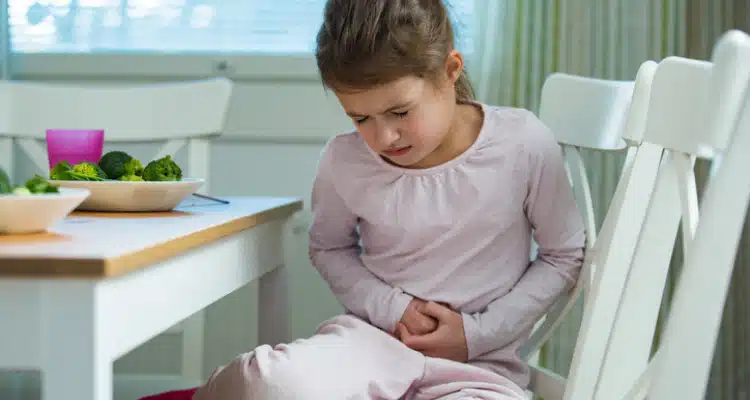


















Leave a comment